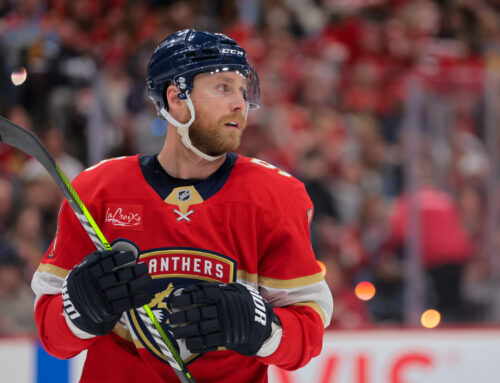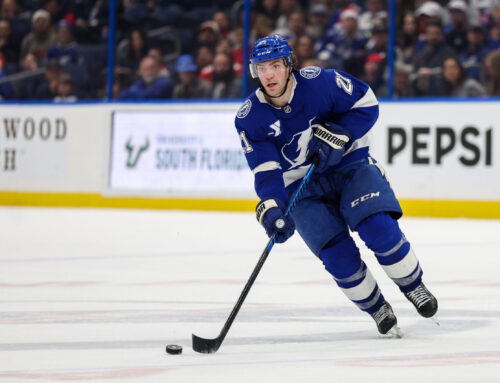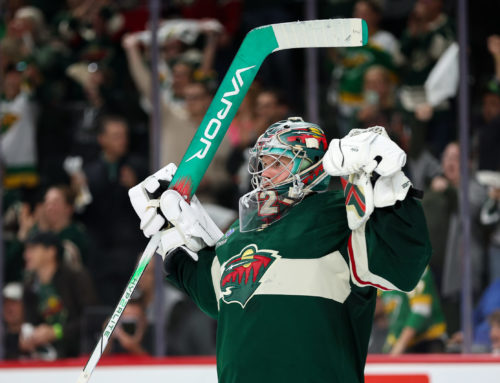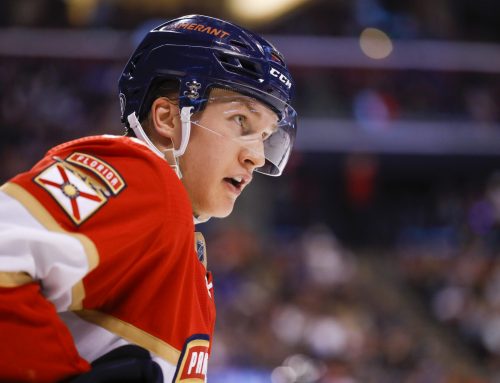
Who would you rather own – Claude Giroux or Nicklas Backstrom? Rick Roos breaks it down…
Although any poolie would be happy to have either Claude Giroux or Nicklas Backstrom on their fantasy team, both players will enter 2016-17 with new concerns for poolies who own them. In particular, can Giroux recover from three straight full seasons of declining point totals, and can Backstrom stay the top center in Washington after the splash made by Evgeni Kuznetsov in 2015-16? Let’s find out –Cage Match starts now!
Career Path and Contract Status
Giroux, now 28, was drafted 22nd overall in 2006 following a stellar QMJHL career. Giroux’s first full NHL season wasn’t until 2009-10, where he posted a solid but not excellent 47 points. From there, Giroux jumped to 76 points, then skyrocketed to 93. Unfortunately, despite the fact that no NHLer has tallied more points dating back to 2010-11, Giroux has seen his scoring drop in each of the last three full seasons, first to 86, then to 73, and finally this past season to only 67, marking his lowest scoring pace since his 2009-10 campaign.
Backstrom, also 28, was selected 18 spots earlier than Giroux in the 2006 draft, but landed in the NHL two seasons sooner. Unlike Giroux, Backstrom made an immediate splash, with 69 points as a rookie. And whereas it took Giroux until his third full season to make his – as yet – greatest impact, Backstrom did so in his sophomore campaign, tallying 101 points and seemingly signaling to poolies he belonged in the same ballpark as elite NHL forwards.
Since then, however, Backstrom has failed to produce another 80+ point season. But his drop in scoring has been less steep than Giroux’s of late, as in the past two seasons Backstrom has nine fewer points than games played (versus 19 for Giroux). Plus, Backstrom is one of only six forwards (Giroux isn’t) to post 70+ points in each of the past three seasons.
Giroux’s contract runs through 2021-22 and dings the cap at $8.275M per season (same AAV), while Backstrom’s ends a bit earlier (after the 2019-20 season) and brings with it a slightly lower ($6.7M) yearly cap hit and AAV.
Ice Time
|
Season |
Total Ice Time per game (rank among team’s forwards) |
PP Ice Time per game (rank among team’s forwards) |
SH Ice Time per game (rank among team’s forwards) |
|
2015-16 |
20:32 (C.G.) – 1st 19:10 (N.B.) – 2nd |
3:51 (C.G.) – 1st 3:04 (N.B.) – 2nd |
1:28 (C.G.) – 5th 0:53 (N.B.) – 9th |
|
2014-15 |
20:33 (C.G.) – 1st 20:31 (N.B.) – 1st |
3:18 (C.G.) – 1st 3:05 (N.B.) – 2nd |
0:45 (C.G.) – 8th 0:57 (N.B.) – 7th |
|
2013-14 |
20:26 (C.G.) – 1st 19:48 (N.B.) – 2nd |
3:44 (C.G.) – 1st 3:40 (N.B.) – 2nd |
0:56 (C.G.) – 7th 0:58 (N.B.) – 8th |
|
2012-13 |
21:10 (C.G.) – 1st 19:54 (N.B.) – 2nd |
3:40 (C.G.) – 1st 3:34 (N.B.) – 2nd |
1:42 (C.G.) – 6th 1:31 (N.B.) – 4th |
The big question regarding Backstrom was what effect the emergence of Kuznetsov would have on his Ice Time. The answer is…….less than I’d have guessed, at least so far. Cases in point – Backstrom’s PP Time, although the lowest of these four seasons, was essentially unchanged from his 78 point 2014-15, and his total Ice Time, also lowest, was only 38 seconds less than his 79 point 2013-14.
But where do things go from here, especially considering Kuznetsov averaged 17:24 per game overall (one of only two players – Jaromir Jagr the other – to finish within the top 30 in scoring while averaging less than 18:12) and 2:11 on the PP (129th! among forwards who played in 60+ games), both of which it’s safe to say should increase? Maybe nowhere, since as recently as 2012-13 Backstrom had point per game production despite another Capitals center (Mike Ribeiro) averaging 17:50 per game with 3:25 on the PP.
Also notable is despite the emergence of Kuznetsov, Backstrom still played 78% of even strength shifts with Alex Ovechkin, which was barely lower than his 83% rate for 2014-15. But Backstrom managed to tally eight of his 40 even strength points in 2015-16 while not on the ice with Ovechkin at even strength, versus only four of 43 in 2014-15. Therefore, even if Backstrom is further separated from Ovechkin, he might make do without a large drop in output.
Turning to Giroux, it’s especially worrisome that his worst season of these four was 2015-16, since his PP Ice Time was the highest while his overall Ice Time was on a par with each of the past two campaigns and his SH Ice Time was less than his point per game 2012-13. Although Giroux is blessed by not having a Kuznetsov-like threat to his top dog role, that also means he seemingly has no excuse for lower production with each passing season. We have to wonder if Giroux might start to cede some prime Ice Time to Sean Couturier, who’s not only five years younger but also is turning into a bona fide producer, as demonstrated by 33 points in his final 46 games for 2015-16.
Secondary Categories
|
Season |
PIMs (per game) |
Hits (per game) |
Blocked Shots (per game) |
Shots (per game) |
PP Points (per game) |
FOW (per game) |
|
2015-16 |
0.68 (C.G.) 0.48 (N.B.) |
1.06 (C.G.) 0.68 (N.B.) |
0.46 (C.G.) 0.66 (N.B.) |
3.09 (C.G.) 1.72 (N.B.) |
0.34 (C.G.) 0.40 (N.B.) |
13.86 (C.G.) 8.78 (N.B.) |
|
2014-15 |
0.44 (C.G.) 0.48 (N.B.) |
1.36 (C.G.) 1.11 (N.B.) |
0.34 (C.G.) 0.63 (N.B.) |
3.44 (C.G.) 1.86 (N.B.) |
0.45 (C.G.) 0.40 (N.B.) |
13.12 (C.G.) 10.51 (N.B.) |
|
2013-14 |
0.56 (C.G.) 0.66 (N.B.) |
1.09 (C.G.) 1.08 (N.B.) |
0.56 (C.G.) 0.66 (N.B.)
📢 advertisement:
|
2.72 (C.G.) 2.39 (N.B.) |
0.45 (C.G.) 0.53 (N.B.) |
11.35 (C.G.) 8.70 (N.B.) |
|
2012-13 |
0.46 (C.G.) 0.41 (N.B.) |
1.18 (C.G.) 0.64 (N.B.) |
0.60 (C.G.) 0.73 (N.B.) |
2.85 (C.G.) 1.71 (N.B.) |
0.43 (C.G.) 0.37 (N.B.) |
13.41 (C.G.) 9.00 (N.B.) |
It’s no surprise that Giroux is the better multi-cat option; but Backstrom holds his own more than I’d have predicted. In fact, in 2013-14 and 2014-15, Backstrom had more PIM and more combined Hits+BS. Shots and FOW are a different story, as Giroux held a clear edge in nearly all seasons, although even there Backstrom was unexpectedly close in a couple of instances.
PP Points are bread and butter for both players, with each averaging no less than one per every three games in all four seasons. Backstrom’s 2015-16 PPP output wasn’t atypical, which is another good news bad news situation — good because it should keep him a fixture on Washington’s PP1 no matter what happens at even strength, but bad because it gives him little realistic room to improve and therefore reinforces he might be more of a 75 point player these days.
In contrast, PP Points seemingly offers only good news – or at least the possibility of good news – for Giroux owners. After all, Giroux’s dip to 0.34 PPP per game from a consistent 0.43-0.45 PPP per game over the past few seasons could explain away his continued drop in production for 2015-16. Had Giroux produced in line with his PPP output over the past three seasons, he’d have accumulated seven more points, which in turn would’ve brought his season total to 74 in 78 games. And suddenly we’d be talking about Giroux having posted the third best full season scoring pace of his career, instead of his second worst. Of course all this depends on whether his drop in PPP was based on unsustainable bad luck, and we’ll check that next.
Luck-Based Metrics
|
Season |
Personal Shooting Percentage |
PDO/SPSV (5×5) |
IPP (5×5) |
IPP (5×4) |
Offensive Zone Starting % (5×5) |
|
2015-16 |
9.1% (C.G.) 15.5% (N.B.) |
995 (C.G.) 1023 (N.B.) |
77.5% (C.G.) 77.3% (N.B.) |
69.7% (C.G.) 81.2% (N.B.) |
51.9% (C.G.) 48.9% (N.B.) |
|
2014-15 |
9.0% (C.G.) 11.8% (N.B.) |
990 (C.G.) 995 (N.B.) |
68.2% (C.G.) 80.0% (N.B.) |
74.4% (C.G.) 74.4% (N.B.) |
53.6% (C.G.) 55.6% (N.B.) |
|
2013-14 |
12.6% (C.G.) 9.2% (N.B.) |
1009 (C.G.) 982 (N.B.) |
71.9% (C.G.) 68.3% (N.B.) |
81.4% (C.G.) 80.8% (N.B.) |
55.6% (C.G.) 57.2% (N.B.) |
|
2012-13 |
9.5% (C.G.) 9.8% (N.B.) |
979 (C.G.) 1027 (N.B.) |
74.2% (C.G.) 83.9% (N.B.) |
70.4% (C.G.) 54.5% (N.B.) |
47.3% (C.G.) 49.9% (N.B.) |
While sure enough Giroux’s 5×4 IPP was his lowest of these four seasons, it was accompanied by his highest 5×5 IPP among them. In fact, the difference between his 5×4 IPP for 2015-16 and his 5×4 IPP average (75.4%) for the three prior seasons was -5.7%, while the difference between his 5×5 IPP for 2015-16 and his 5×5 IPP average (71.4%) for the three prior seasons was +6.1%. In fact, had Giroux instead finished with a 5×5 IPP of 71.4% and a 5×4 IPP of 75.4%, he would’ve posted one fewer point for the season. Not good.
Beyond that, Giroux’s 2015-16 OZ% and PDO/SPSV weren’t abnormally low. But his OZ% has been trending down, which is concerning in and of itself but even more so since Couturier’s has been increasing (40.2% in 2014-15; 43.8% in 2015-16) yet still has room to grow, in which case one would expect that to come at Giroux’s further expense. Also, Giroux’s shooting % for 2015-16, although less than his 11.0% career average, is similar to what he’d posted in two of the past three seasons when his production was much better, so poolies can’t bank on that rebounding nor blame it for his scoring woes. In all, Giroux’s luck-based metrics don’t paint a picture of a production rebound.
As for Backstrom, it’s a positive he managed to post 70 points in 75 contests despite an OZ% which was well lower than his prior two campaigns. On the flip side, it’s not encouraging that his per game scoring rate was lower than in any campaign dating back to 2010-11, what with him having his highest combined IPPs among these four seasons and a shooting %, which, at 15.5%, was not only well above his career average (11.3%) coming into 2015-16, but higher than he’d posted in any previous season. A small silver lining is the fact that due to Backstrom being a light volume shooter, his higher shooting % meant only about five added goals. But still – if we remove those from the equation, his production becomes 65 points in 75 games, which is still very solid but not only a step down from his norm but also troublesome because it was before what we figure will be even more impact from Kuznetsov.
Who Wins?
All things considered, Backstrom seems poised to be the heir apparent to Joe Thornton in that he’s very skilled and consistent, plus plays the type of game to be able to produce well into his 30s. And like Jumbo Joe, Backstrom also probably won’t be given proper value by poolies due to his single position eligibility and lack of high volume shooting.
So the question becomes – is that better than what Giroux stands to offer? My view is yes – Backstrom is now a better fantasy value than Giroux. They key word is value, as Giroux still might outpoint Backstrom next season and/or other times down the road. But as much as Backstrom is given short shrift by poolies, Giroux is overvalued, as demonstrated by Backstrom having been drafted in Yahoo leagues, on average, 21st among center-eligible players for 2015-16 (and 55th overall), compared to 5th among centers (9th overall) for Giroux. That’s simply far too wide of a discrepancy.
So what should poolies do? Continue to draft Backstrom in one-year pools with confidence, just making sure not to jump on him too early because chances are he’ll still be there once many of the other threats for 70+ points are gone. And in keepers, concerns about Kuznetsov stealing Backstrom’s thunder might make Backstrom’s cost low enough for you to gain by trading for him.
As for Giroux, I think he’s a player to avoid in all but “kitchen soup” one-year leagues, since at the price you’ll have to pay the very best you could hope for is you break even, while more likely than not he’ll disappoint in relation to his cost. In keepers, you might want to start to at least listen to (or make) trade offers, especially if you’re in a rebuild.
2 Comments
Leave A Comment
You must be logged in to post a comment.





 CHI
CHI BUF
BUF NYR
NYR TOR
TOR ANA
ANA PIT
PIT N.J
N.J L.A
L.A DET
DET CAR
CAR CGY
CGY

Going forward in a limited (6) keeper , with both only being C eligible (ESPN), then Backstrom would be the better own ?
If you have both, shop both, and see what offers you get. They are close enough that the market will often determine who is the better player to keep versus trade.